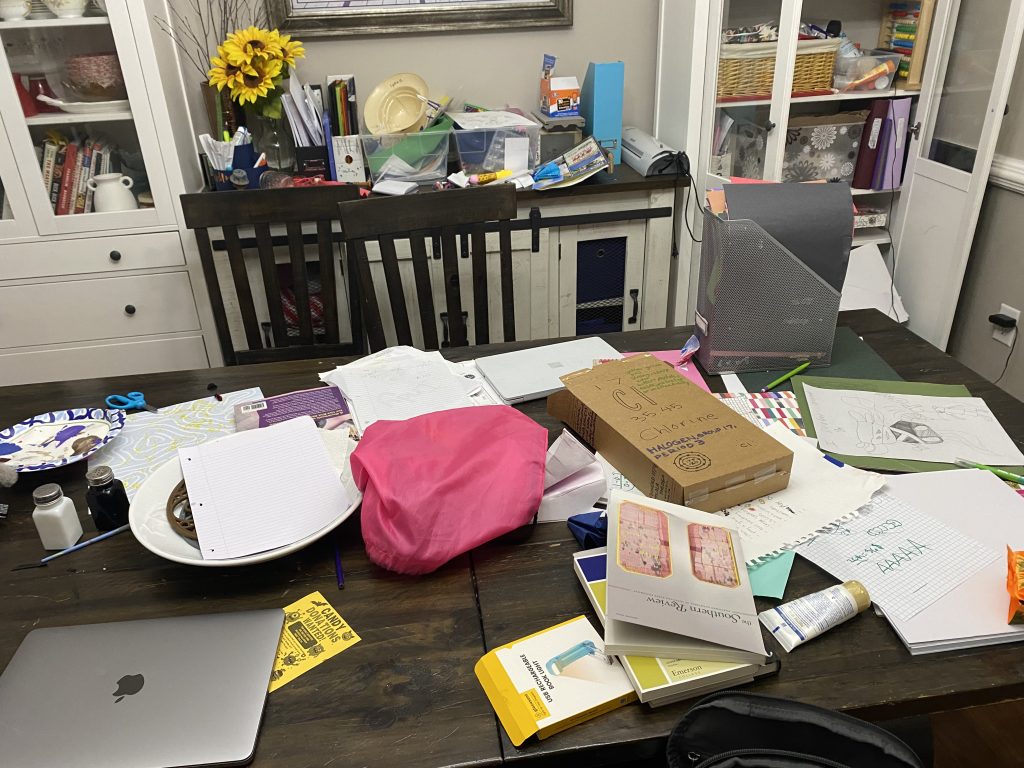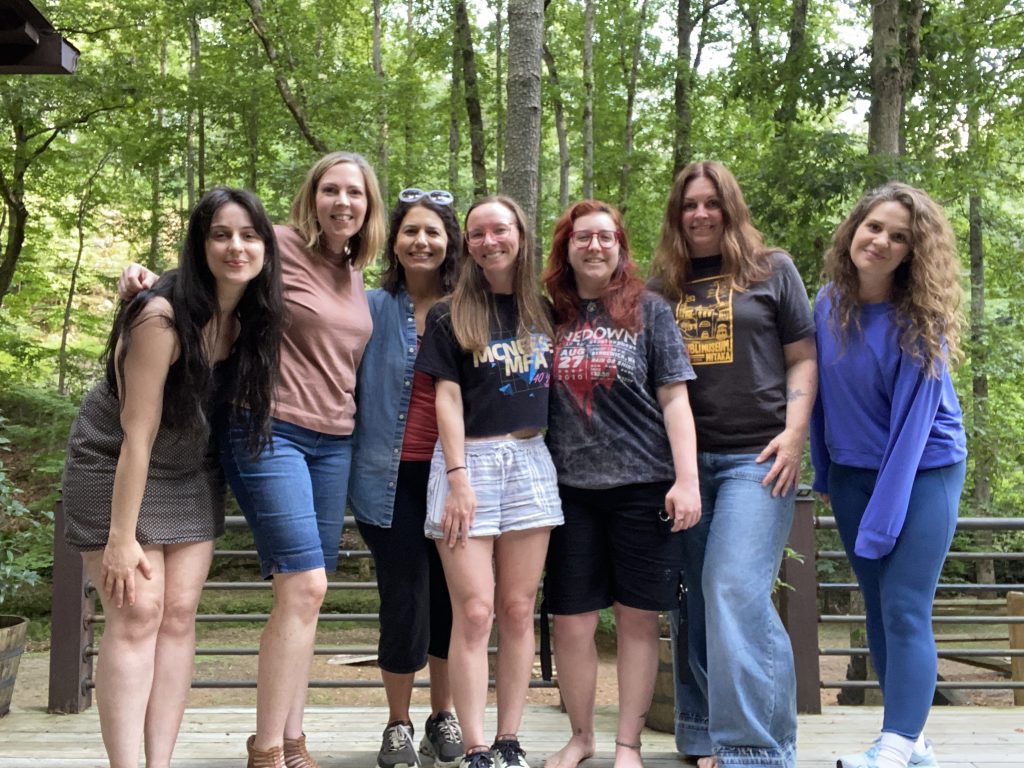On Writing as a Parent/Parenting as a Writer
by Liz Garcia · October 10, 2025In 2022, I hit a milestone: all three of my children were old enough to be at school all day. For me, this meant a freedom paralleled only by the emancipated animals of Ringling Bros., or the Munchkins of Oz, the villains in this case being the munchkins, what Caroline Bird has called the “little tyrants” in her poem “Little Children.” Picture frolicking. Picture Julie Andrews twirling in a meadow in her bathrobe.
Yes, I exaggerate. (I love my kids). But here’s how I described that feeling of freedom that day in my rarely used blog:
Today I sent my youngest child cheerfully off to her first day at all day preschool—then two hours later broke down sobbing, but not for the reasons you might think. What suddenly hit me while doing the dishes, was the poignant realization that I had just spent an extra half hour eating my breakfast, pondering the mysteries of the universe, thoughtfully responding to a friend’s Facebook post with a link to a Ross Gay poem that opened my soul back up to what words can do for us—and that I could follow my thoughts to actual feeling without being interrupted by MOMMY-I’m-done-on-the-potty! or MOMMY-I-want-my-screen-time! or MOMMY-I want-another-bagel-with-strawberry-cream-cheese! I discovered that my brain had been able to naturally follow some path to fruition, and that I suddenly had the luxury of TIME to just be with my thoughts.
If you’re a parent, you’ll appreciate this anxiety, and perhaps what it’s like to vacillate between periods of writing and unwriting/unthinking, or between being a writer and a zombie. Now that they’re 7, 11, and 13, and all in school during the day, I definitely have more time to devote to writing, and to attend grad school full time. But the mental vicissitudes haven’t changed. When they’re home for a week, or a weekend, or when school’s out for the summer, my brain starts to lose the ability to think creatively. Atrophy isn’t too strong a word. For thirteen years, I’ve had to learn how to start over, again and again. What follows is essentially a list of practices that have helped me do just that.
(Caveat: I’m not a single parent. I have a very supportive spouse who, since COVID, primarily works from home, so I don’t have to completely earn our living and care for the kids. He also chose a somewhat lucrative field, so while we live modestly on principle, if my advice reeks of privilege, it’s because I haven’t had to pinch pennies to feed or clothe us.)
Making Time & Space:
Let go of the “work first, play last” mentality. What that ends up translating into is filling your peak kid-less hours with domestic chores and adulting duties, and not having writing time at all. It’s also a great recipe for resentment and burnout. As Elizabeth Gilbert advises in her book Big Magic (which was instrumental in helping me through this process), you have to view your writing as your work, your “vocation.” While I know a lot of parents who get up early to write (Glennan Doyle wrote in her closet at 4am for I don’t know how many years), I only had a brief window of time in which that strategy was successful for me. When they were toddlers, I swear they could smell when I’d wake up, no matter how quiet I was, and they’d come find me. That’s changed now—but my body now needs more sleep than it used to, so I can’t rely on rising at 5 a.m. anymore. My peak times are somewhere between 9-12 a.m., so that’s when I write. My third child was two when I made this adjustment (I confess, that meant 2 hours of tablet time for her—and she survived), and I was amazed at (1) how much happier I was, and (2) how many domestic duties I was able to squeeze in when they were doing their homework, or waiting for them at their activities.
Let go of the non-essentials, like school fundraisers and folding your kids’ laundry. (When they’re old enough to care, they’re old enough to DIY.) Find shortcuts. Grocery delivery or pickup, easy heat-up meals. Let the house be dirty. (My each kids have to do one chore per day, and we do some extra cleaning on the weekend.). I continued these habits when I went back to grad school full time, and it’s saved my sanity.
Schedule retreats. When I began my newfound philosophy, I was serving as poetry editor of a small publication and received a small quarterly stipend, and decided to use this to fund a quarterly weekend retreat: Just me and an Airbnb—a modest place, within driving distance, near nature with an indoor and outdoor space to write. It was both a “mommy” retreat focused on self-care, and a time to spend hours focused on my projects. Between these retreats and the hours I spent writing while my daughter was in preschool, I was able to finish my first book within two years.
Pay Attention. I think most parent creatives are used to this strategy. When I’m with my kids on break, or on Saturdays, I try to just take notes rather than mentally check out (though when they begin reciting the plot of an obscure cartoon, I feel no obligation to listen). What are their curious questions and language slips? The “magic moments” of their childhood? The sensory details of the moment?
Zone out in productive ways. I try to carry a book, notebook, and drafts of poems in my purse for the times we’re at the park and they can just GO PLAY. Or when I’m somewhere with the kids that they don’t need me, but I can’t create (like the indoor trampoline park), I bring my laptop and work on left-brained tasks, like the part-time business of submissions: looking up journals, finding deadlines to meet, and submitting work.
Make Space. This is really about “manifesting” your vocation in a physical way. I decided I needed a space that wasn’t cluttered with Mom things—bills, kid’s toys and school papers. So I bought a desk that was specifically for my notes and books, and I try (try!) to keep it that way. But making space might also mean working away from home. My favorites are Starbucks, the meetings rooms in public libraries. (My most recent favorite is the special collections reading room with a gorgeous mural on the wall and huge windows, in a north Georgia town that will go unnamed because I don’t want to risk seeing anyone I know there. (I once even found a quiet space in a side lobby of a small hospital. Don’t judge.)
Warming Up:
This might be much easier for other people. But I really have to do some serious mental gymnastics to wake up my right brain after being with my kids. So when I do have a writing day or retreat, here’s my process (not necessarily in this order):
Re-read a craft book. Bird by Bird by Anne Lamott, Why Poetry by Matthew Zapruder, A Poet’s Companion—there are plenty to choose from. Gregory Orr’s book A Primer for Poets is on my list. As I referenced earlier, Big Magic and Gilbert’s podcast “Magic Lessons,” which helped me face and overcome many of my fears and insecurities. I needed to ponder why I’m doing this, who I’m doing it for, and give myself permission, as a Mom, to make time and space for developing my talents.
Spend time just slowing down and pondering, without worrying about articulating anything yourself. (If you need to journal to just rediscover your own feelings and thoughts, great. But don’t start by trying to write a poem, if you’re anxious about it—and especially if you’re starting with a blank page. Save that for later.) Do things that help you pay attention to all your body’s sensations, the smallest things around you. Eat delicious food slowly. Listen to birds! (If you haven’t yet discovered the Merlin app, or the Seek app, there’s a treat in store for you!
Listen to poetry. My favorite podcasts: Poetry Unbound, Poem of the Day, The Slow Down, Poetry for All. Let the rhythms and language sink into your psyche.
Take a book on a walk. Something about movement helps your right brain wake up, which is why there’s a long history of poems about taking walks. Take notes on things you want to “steal”: words, rhetorical moves, on-ramps, conceits
Try a writing exercise. A cento is a great one—you don’t have to come up with any original words! Whatever you do, don’t start with a blank page! Pull something from your list of notes to play with. Ross Gay has said “Don’t write the beautiful thing.” Trust that something will come to you that arouses your curiosity, that drives you to the page to uncover and interrogate it, to write into the mystery of it, to find just the right word or image to start following.
Be kind to yourself, especially if you have a really dull writing session, when nothing feels worth saving. Remember that it’s not about productivity, but about whether or not you showed up to spend time on the process. Reward yourself for doing the hard thing, for facing the voices of doubt.
Resources:
If you’re looking for a residency or fellowship, it can be challenging to find those that are under two weeks (which is too long for me to be away). Below I’ve listed some residencies and fellowships that have one-week options, many in the South. Though I have yet to actually participate in any of these (some of them are competitive), finding them takes time many parents don’t have, so here you go.
Retreats/Residencies/Fellowships
- VCCA (Amherst, VA. A residency for multiple genres, fellowships and financial assistance available, requires application. Stays are up to 2 weeks.)
- Rockvale Writer’s Colony (College Grove, TN. This is a retreat location for writers, not a residency, but it seems far less competitive that other places, though you do have to apply. But the calendar looks very flexible.)
- Porches (Norwood, VA: This organization has several genre and fellowship options; the Poetry fellowship has a 1week award.)
- SAFTA (Knoxville, TN: 1-3 week residencies on a working farm, for nominal fees. They do require you to do farm chores—which is why I haven’t applied.)
- The Betsy Hotel (Miami, FL: A room for writers, FREE, usually Sunday through Wednesday. Application required.)
- Tin House (Portland, OR: They have parent residencies, and also allow children. They’re 2026 applications are still TBA however, and I’m not sure when they’ll reopen.)
I’m going to end with a poem I wrote in 2022 that I called “Cotyledon.” I was trying to express this angst of regaining words—and in the process, realized that the words I needed were right there, waiting for me. What it’s finally become easier to do over the years is to have faith in one thing: no matter how many times I’ve had to start over, they always come back.
Elizabeth Garcia is the author of Resurrected Body (Cider Press Review, 2024) and Stunt Double (Finishing Line Press, 2016). She received a BA in Humanities from BYU, an MA in English Lit from VSU, and is currently pursuing an MFA in Creative Writing at GSU. She’s a Georgia native, mother of three, and amateur family history buff.


